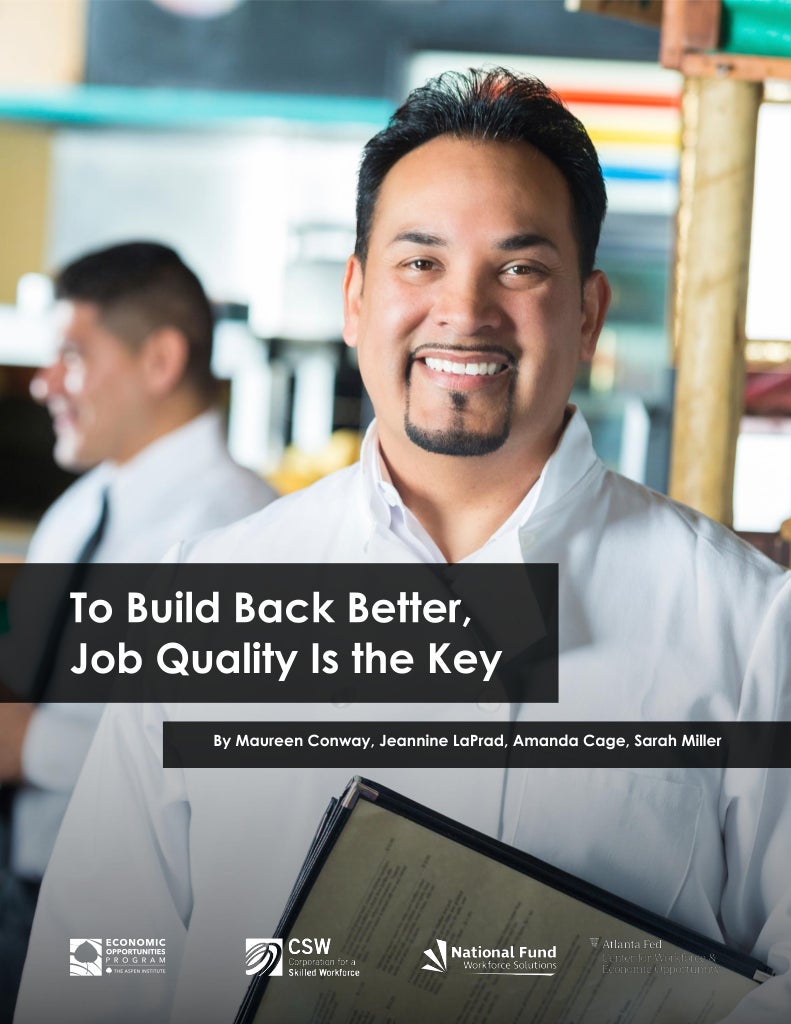The United States has a problem—too few quality jobs. This problem contributes to a variety of national ills, from low productivity to poor health, to fractured politics and divisions within society. Low job quality has disproportionately negative effects on women workers and workers of color, contributing significantly to earnings and wealth gaps across demographic groups.
In “To Build Back Better, Job Quality is the Key,” Maureen Conway (The Aspen Institute Economic Opportunities Program), Jeannine LaPrad (Corporation for a Skilled Workforce), Amanda Cage (National Fund for Workforce Solutions), and Sarah Miller (Federal Reserve Bank of Atlanta) make the case that improving job quality should be a central goal of economic recovery and rebuilding efforts, and they lay out practical policy ideas toward that end. The report includes a framework illustrating the multiple dimensions of job quality and outlines the variety of institutions and organizations that can play a role in improving job quality. Particular attention is given to the role of federal policy and to the practices of local governments, economic development, and workforce development organizations.
Share
Tweet Report: “To #BuildBackBetter, #JobQuality is the Key” by @conway_maureen (@AspenWorkforce), @jeannine_laprad (@skilledwork_org), @WorkforceAmanda (@National_Fund), and Sarah Miller (@AtlantaFed).
Tweet Expanding the quantity of good jobs, and improving the quality of existing ones, must be a central goal of our recovery. Read more from @conway_maureen, @jeannine_laprad, @WorkforceAmanda, and Sarah Miller.
Tweet Improving #jobquality should be a central goal of recovery. This report by @conway_maureen, @jeannine_laprad, @WorkforceAmanda, and Sarah Miller lays out practical ideas for doing so as we #BuildBackBetter.
Tweet How can policymakers promote #jobquality? In addition to rules and regulations, the government can incentivize and reward the creation of higher-quality jobs in its role as a purchaser of goods and services.
Tweet We must build an economy where people can work with dignity, support themselves and their loved ones, and contribute to a healthy and thriving society. Improved #jobquality is essential to #BuildBackBetter.
About the BETS Taskforce
The Better Employment and Training Strategies Taskforce (BETS) is a coalition of more than 40 leading practitioners and experts working to modernize the United States’ outdated patchwork of workforce policies. The five BETS workgroups were convened in November 2020 to develop recommendations aimed at informing the incoming Biden-Harris administration and the 117th Congress on issues and policy options related to unemployment insurance, workforce development, job quality, youth employment, and federal jobs initiatives. The BETS Taskforce was convened by Prof. Stephen Crawford of the George Washington Institute of Public Policy, Stuart Andreason of the Federal Reserve Bank of Atlanta, and Larry Good of Corporation for a Skilled Workforce.
The above document is the final product of the job quality workgroup chaired by Maureen Conway of the Aspen Institute Economic Opportunities Program and Amanda Cage of the National Fund for Workforce Solutions. Members of the job quality workgroup included Amanda Cage (President and CEO, National Fund for Workforce Solutions), Maureen Conway (Vice President, The Aspen Institute; Executive Director, The Aspen Institute Economic Opportunities Program), Livia Lam (Senior Vice President, Federal Relations, Strategies360), Jeannine LaPrad (Senior Fellow, Corporation for a Skilled Workforce), Sarah Miller (Senior Adviser, Center for Workforce and Economic Opportunity, Federal Reserve Bank of Atlanta), Mary Alice McCarthy (Director, Center on Education & Labor, New America), and Iris Palmer (Senior Advisor for Higher Education and Workforce, Education Policy Program).
The Aspen Institute Economic Opportunities Program is proud to participate in BETS. Click here to learn more.


